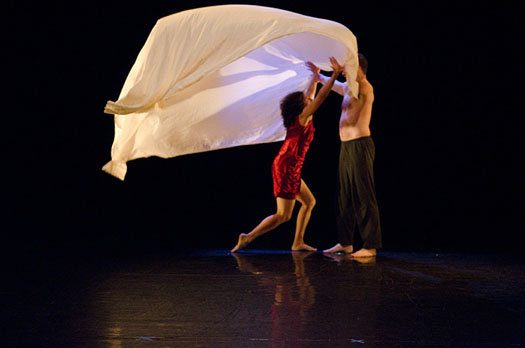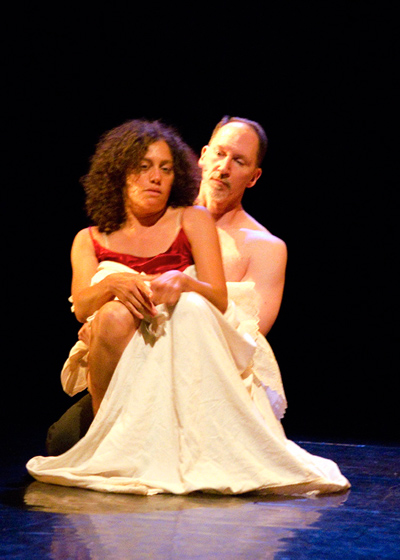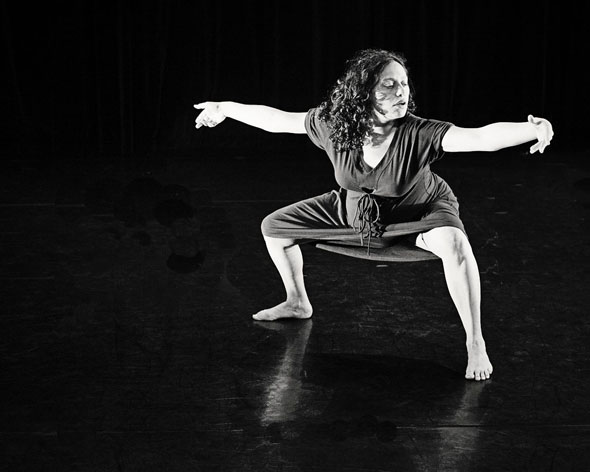"In a separate piece, Amanda Abrams was brilliant as the long-suffering Penelope weaving away as she waited years for her husband, Odysseus, to return. For most of “Penelope and Odysseus/Waiting,” Abrams remained in a chair, almost magically defying the limits of scale and reach that this imposed. Her arms spoke volumes. In her hands, repetition became a powerful force. What a riveting mover she was."--from the Washington Post review of Human Landscape Dance's performance at Dance Place, Washington DC, in December, 2012, by Pamela Squires.
Our mythology dances emphasize the personal, human sides of heroes. "Penelope and Odysseus," for instance, is about the wife, not the husband, and about a relationship that is strung over many estranged years.
The dance opens with a duet, "Leaving." Set before Odysseus leaves for the Trojan War, he and Penelope bustle over the baggage, last-minute phone calls, scrambling to make online hotel reservations in a foreign language. The two, played by Amanda Abrams and Alexander Short, dance over, under, and around each other. Abrams leaps against Short’s shoulder, twisting him under her arm, is herself lifted and spun halfway around, knocks him off of her hips, then flies backward and upward against him. When they pause, they have too much to say: hopes, memories, anxieties--too much for a simple goodbye. They stare at each other until, safer to be busy, their wandering eyes spy more tasks to perform.
The middle section, "Waiting," is a solo for Abrams. She embodies Penelope at home while Odysseus is presumed lost: angry, lonely, and overwhelmed by raising a child on her own. She weaves a shroud for her father-in-law, miming the warping and tensing of threads in air. She then unravels it in frustration, tugging strands across the stage. She feels buried alive, as if the best years of her life were wasted on fending off suitors and undoing her own painstaking work, just because her husband is unlucky. She feels as if the shroud is for her, feels its suffocating pressure, and must peel it off. Abrams partners with the music, composed and performed by Andre Cutair. Her song is the partner that she does not have physically: Odysseus as siren.
The final section, "Odysseus Comes Home," depicts Odysseus and Penelope's first night together after his 20-year voyage. This is a less heroic view of Odysseus and Penelope. It depicts how people who know each other well have to, from time to time, rediscover each other. After Odysseus's long absence, sharing a bed must have been awkward at first.
This is less a story of sexual compatibility, than of sleep compatibility. Sharing a bed is an act of love, but also a practical matter. Difficulties arise when one partner likes to sleep without a blanket, but the other always sleeps with one; when one partner snores; if there is a dip in the bed so that one partner is always squished; when one partner can't sleep, but doesn't want to disturb the other; etc. It takes time to work through such matters, as in so many areas of marriage.
A marriage begins with one set of people, but continues to change as the partners grow and change. Odysseus and Penelope will have had to get to know each other again when he returned. So, too, even a couple that sees each other every day, may become estranged. We grow apart, then find ways to return to each other. In a long marriage, this may happen several times.
As the piece opens, the couple is separated by a sheet: a sail that stretches across Short's shoulders, the shroud that Abrams has repeatedly woven and unwoven in an attempt to hold off her suitors. The sheet also covers Abrams as she lies at a right angle to Short, awkwardly sharing the same bed. Abrams begins to turn, rolling up the sheet, pulling Short off vertical and onto the floor.
The couple scrabbles over the sheet. It becomes a hiding place, alternately covering Odysseus's and Penelope's bodies. It becomes a rope held taut between them. Short rolls himself in it; Abrams whips it off, spinning him around.
They drop the sheet, but are not free. They cling to each other, hands held, as they struggle. Short reels Abrams to himself, and she yanks away, pulling him underneath her. She rolls him over her shoulder, and he flips her over his back. Odysseus's first night back is fraught with mistrust. The couple ends slumped together, spent, but parallel.
Photos on this page by Jennifer Mueller and Siobhan Hanna. Videography by Denaise Seals.


